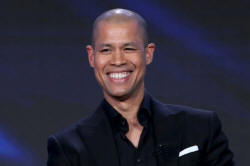Reporter Without Borders: Life lessons with Vladimir
Duthiers
 Send a link to a friend
Send a link to a friend
 [June 28, 2018]
By Chris Taylor [June 28, 2018]
By Chris Taylor
NEW YORK (Reuters) - TV news viewers may
recognize one reporter who pops up in trouble spots all over the world:
From the 2010 earthquake in Haiti, to the Boko Haram kidnappings in
Nigeria, to assorted crises in Mali, Thailand, Algeria and the Mideast.
In an era when news reports largely rely on file photos and videos, CBS
correspondent Vladimir Duthiers reports stories the old-fashioned way -
on location. Risking your life like that tends to quickly put everything
in perspective.
Reuters spoke with Duthiers, 48, for the latest in our "Life Lessons"
series, about his winding career path that has landed him at multiple
crossroads of history.
Q: When your parents came to America from Haiti what outlook on life did
they share with you?
A: Like many immigrants, their attitude was study hard and work hard,
and anything is possible. It doesn't matter where you come from or what
you look like, as long as you are willing to do whatever it takes to
take it to the next level. As a result, they were pretty strict with me.
I wasn't even allowed to wear sneakers to school.

Q: Did the fact they came from a poor country shape their perception of
money and success?
A: They came to the U.S. in 1962, and back then Haiti was very
different. It was like Havana in its heyday: Paved roads everywhere,
policemen in uniforms, soccer matches on beautiful pitches, amazing
hotels. For older Haitians, it's hard to reconcile the country they
remember with the Haiti they see now.
Q: You are a familiar TV face now. You didn't start out in journalism.
What made you switch?
A: I started working on Wall Street, actually – first for Lehman
Brothers, then for the firm that is now Alliance Bernstein. I wasn't
fulfilling the promise I made to myself, that I wanted to be like Mike
Wallace or Ed Bradley or Ted Koppel.
Q: Were you OK with earning a lot less money?
A: No, I was not! Most managers I interviewed with said, 'You are 38,
you are working for one of the largest investment firms in the world,
and you clearly have no idea what you are getting into.' They thought I
wasn't serious about it. So I had to intern for free. I had some money
saved, but I also had tuition and a mortgage payment and student loans,
so I didn't emerge from the financial abyss until a couple of years ago.
[to top of second column] |

Vladimir Duthiers, correspondent for CBS News. Picture taken:
January 12, 2016. REUTERS/David McNew

Q: The 2010 earthquake in Haiti launched your career. What did you take away
from that experience?
A: After the earthquake happened, I was at CNN, and Anderson Cooper asked if I
wanted to be part of the team covering it. I said yes, and they said, 'Be at the
airport in an hour.' But at first I had no idea how bad it was. We ended up
being there for 40 days straight, in incredibly difficult and horrific
conditions. There were huge mass graves, filled to the brim with people – men,
women, children. I'll never forget what I saw. I just thought, 'There but for
the grace of God go I.'
In many cases I would start to cry, and Anderson would tell me that it was OK.
It's important not to lose your humanity.
Q: Having seen so much tragedy around the world, where do you devote your
philanthropic dollars?
A: It's hard for me to pick, because there are always problems everywhere. But
the International Red Cross and Doctors Without Borders are two organizations
that do quality work, and don't focus on any specific country.
Q: What life lessons would you pass along to others?
A: A lot of kids these days see journalism as just a way to get on TV. But every
single day, someone, somewhere is risking their life to do this job, because
it's so important to democracy and civilization. So you may be in a situation
where your life is at risk – and if you are not prepared for that, then this is
not the profession for you. It is not a job to be taken lightly.
(The writer is a Reuters contributor. The opinions expressed are his own.)
(Editing by Beth Pinsker and Richard Chang
[© 2018 Thomson Reuters. All rights
reserved.] Copyright 2018 Reuters. All rights reserved. This material may not be published,
broadcast, rewritten or redistributed.
Thompson Reuters is solely responsible for this content.
 |